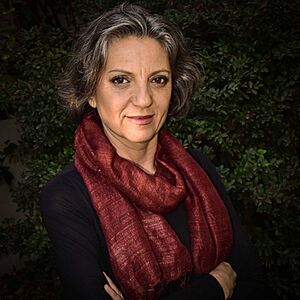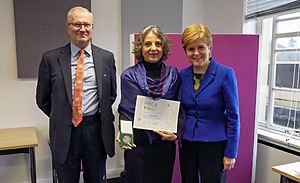Sandra Díaz (ecologist) facts for kids
Quick facts for kids
Sandra Díaz
|
|
|---|---|

Dr. Sandra Myrna Díaz
|
|
| Born |
Sandra Myrna Díaz
|
| Nationality | Argentine |
| Alma mater | National University of Córdoba |
| Known for | Plant biodiversity |
| Awards |
|
| Scientific career | |
| Fields | Community ecology Plant functional traits Functional diversity Global environmental change Social benefits of biodiversity |
| Institutions | Instituto Multidisciplinario de Biología Vegetal, CONICET & National University of Córdoba University of Sheffield |
Sandra Myrna Díaz (born in 1961) is a famous ecologist from Argentina. An ecologist is a scientist who studies how living things interact with each other and their environment. She is a professor of ecology at the National University of Córdoba.
Dr. Díaz is known for her research on the "functional traits" of plants. These are the special jobs and features plants have, like the size of their leaves or how fast they grow. She studies how these traits affect the entire ecosystem, which is the community of plants, animals, and their environment.
She is a top member of Argentina's main science organizations. Her work is so important that she is one of the most referenced scientists in the world. In 2019, she was elected as a Foreign Member of the Royal Society in London, a high honor for scientists.
Contents
Early Life and Schooling
Sandra Díaz was born in Bell Ville, a city in the province of Córdoba, Argentina. She grew up in a home where plants were loved, and her parents kept large gardens. This inspired her interest in the natural world.
Díaz went to the National University of Córdoba and graduated with high honors in biology in 1984. She knew she wanted to be a scientist who helps the environment. She stayed at the same university to earn her PhD in biological sciences in 1989.
For her PhD, she studied plant functional traits. These are the characteristics that determine how a plant lives and what job it does in its environment. She helped create new methods for scientists to use these traits to understand ecosystems better.
Career and Scientific Discoveries
A book by scientist J. Philip Grime inspired Díaz to study in the United Kingdom. In 1991, she joined the University of Sheffield to continue her research.
Studying Plants and Climate Change
At Sheffield, Dr. Díaz investigated how plant communities react to higher levels of carbon dioxide (CO₂). Carbon dioxide is a gas in the air that is increasing and causing climate change.
She made a groundbreaking discovery about the relationship between plants and tiny organisms in the soil called microbes. She found that even with extra fertilizer, fast-growing "weedy" plants did not do well with high CO₂ levels. However, the soil microbes loved the high CO₂. This showed that plants and soil microbes compete for important nutrients like nitrogen.
Understanding Plant Diversity
Díaz returned to Argentina in 1993 and continued her work on plant traits. She was a main author for a chapter in the 1995 report by the Intergovernmental Panel on Climate Change (IPCC). The IPCC is a group of top scientists who provide information about climate change to world leaders.
She founded a research center called Núcleo DiverSus to study biodiversity and sustainability. There, she created a new way to measure the variety of jobs that plants do in an ecosystem. This tool helps scientists see how losing or gaining certain plants can change the environment.
Dr. Díaz was the first to create a global picture of the functional diversity of vascular plants (plants with special tissues to move water). She built a huge database with information on tens of thousands of plants, with help from 135 other scientists.
How Plants Are Designed
Díaz studied how different "plant designs" affect the environment. She showed that plants have a trade-off. Some plants are designed to grow fast and use up resources quickly. Other plants are designed to grow slowly and conserve their resources. These designs include how long their leaves live, how they make seeds, and the type of wood they have.
In 2016, she presented the first-ever global map of these essential plant designs, which she called the "global spectrum of plant form and function."
Connecting Nature and People
Dr. Díaz is also interested in how people and nature are connected. She studies how different societies value and depend on their local ecosystems.
She helped create a framework to connect the variety of plant traits to the benefits people get from nature. For this work, her paper won the Cozzarelli Prize in 2007. She brought together ecologists and social scientists to work with communities. The social scientists would ask people what they needed from their environment, while the ecologists studied the plant traits that provided those benefits.
Her work led to the idea of "nature's contributions to people." This concept is now used by major international groups like the Intergovernmental Science-Policy Platform on Biodiversity and Ecosystem Services (IPBES), which advises governments on how to protect nature.
Other Work
In 2023, Dr. Díaz was chosen by the United Nations Secretary-General António Guterres to be on the UN's Scientific Advisory Board. This group gives scientific advice to the UN on major global challenges.
Awards and Recognition

The science journal Nature named Díaz one of the "ten people who mattered in science in 2019." Her work has earned her many awards from all over the world.
- 2008 Ecological Society of America Sustainability Award
- 2008 Proceedings of the National Academy of Sciences of the United States of America (PNAS) Cozzarelli Prize
- 2009 Elected member of the National Academy of Sciences
- 2013 Platinum Konex Award in Biology and Ecology
- 2014 Bernardo Houssay Award in Biological Sciences
- 2014 Honorary member award of the British Ecological Society (BES)
- 2017 Ramon Margalef Prize in Ecology
- 2018 Named by Nature as one of five "ones to watch" in 2019.
- 2019 Princess of Asturias Awards
- 2019 Elected a Foreign Member of the Royal Society (ForMemRS)
- 2019 Royal Norwegian Society of Sciences and Letters Gunnerus Award
- 2020 BBVA Foundation Frontiers of Knowledge Award in Ecology and Conservation Biology
- 2022 Elected an international member of the American Philosophical Society
- 2022 Awarded the 13th Kew International Medal by Kew Royal Botanic Gardens
- 2023 Royal Botanic Garden Edinburgh Medal from the Scottish First Minister, Nicola Sturgeon
- 2023 Platinum Konex Award in Ecology and Environmental Sciences
- 2023 Diamond Konex Award in Science and Technology
- 2023 Linnean Medal awarded by the Linnean Society of London
- 2025 Tyler Prize for Environmental Achievement
 | Precious Adams |
 | Lauren Anderson |
 | Janet Collins |

